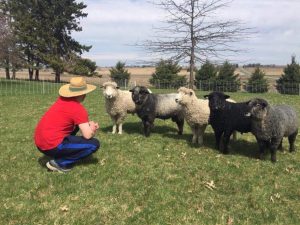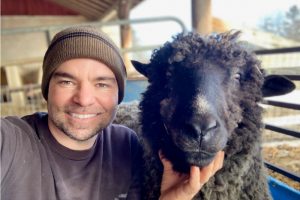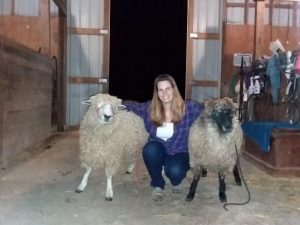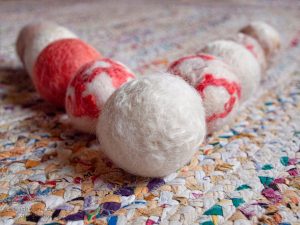By Nancy Breed –
What do eight Driftless Area farmers have in common with George Washington and Thomas Jefferson? Their flocks include Leicester Longwool sheep, a ‘critically rare’ breed according to the American Livestock Breeds Conservancy. Currently there are just 140 flocks in the nation, including five in Wisconsin, two in Illinois and one in Minnesota’s Driftless regions.
The breed originated in the Leicester (pronounced lester) region of England. Although it is a very old breed, Robert Bakewell, a pioneer in the field of animal genetics, is given credit for improving it during the 18th century. Both founding fathers had large flocks of sheep and took great pains to import Leicester rams from England to improve their herds.
For a short period it was the most popular breed in the world, considered to be the first genetically improved breed of sheep. Descendents include many of today’s modern breeds which over time eclipsed their ancestor in popularity. Leicester Longwools became extinct in America about 1920. In an effort to revive the heritage breed in the U.S., Colonial Williamsburg acquired 15 sheep in 1990. It currently maintains a herd of about 50 in its living history museum.
Leicester Longwools are large, docile sheep with a heavy fleece of curly, lustrous wool that grows up to 14 inches a year. The breed is generally white but colored sheep occur and can range from black to ‘English Blue’ (deep gray to silver). Their wool is highly valued by hand spinners and weavers for its handle and beautiful dye acceptance.
The U.S. Leicester Longwool Sheep Breeders Association (LLSBA) was founded to preserve the endangered breed, enforce breed standards and promote the interests of Leicester breeders. It maintains a registry which serves as a census of the breed in the United States, with numbers reported annually to the Livestock Conservancy.
The Berryhill Farm

David Berryhill of The Berryhill Farm in Pine Island, MN, at the northernmost tip of the Driftless, is LLSBA’s vice-president. “I first learned about the Leicester Longwool breed from a magazine article — probably in 2007. There were two primary things that captured my heart: I am fascinated by the breed’s history; the second thing that drew me to them is their beauty! I love the way their long wool drapes around them and the dreadlock appearance of their forelock.”
From his initial purchase of three ewe lambs in 2008, Berryhill’s flock currently stands at 78, including 34 lambs born this spring. He has a mixture of white and natural colored sheep which he uses for breeding stock, meat and wool. “I try to sell as much of the wool as I can as raw wool,” he said. “Typically that is the most profitable because I do not have to invest money into further processing. That said, I also have wool available in various forms from washed fleece to yarn and everything in between…like roving, dyed locks, etc. It is my intention that the sheep pay for their keep as much as possible so that I can afford to keep raising them.”
In 2015 Berryhill participated in a Card Grading event at the Maryland Sheep & Wool Festival to celebrate the 25th anniversary of the LLSBA and the reintroduction of the Leicester Longwools to the U.S. All five Berryhill Farm sheep entered received Blue Cards for excellence in breed standards.
The Berryhill Farm added Wensleydale sheep (also long-woolled) several years ago, plus it also hosts a muster of peacocks that roam the farm with a few chickens.
RoundAbout Farm
On the eastern edge of the Driftless near Mt. Horeb, WI, Travis Wright manages a flock of 30 ewes and five rams. The farm welcomed 40 lambs this spring. He started with six Leicester Longwools nine years ago after falling in love with the breed at first sight. “Visually, I am drawn to their unique appearance,” said Wright. “I find them very beautiful. I appreciate their classic type and outline. Now that I know the breed, I appreciate their calm dispositions, personalities, gentle spirits, and productivity.”

Wright feels Leicesters are well suited to the small farm environment, as they thrive with thoughtful management. “These are not sheep that can be cast into the wild to survive as they were bred to be managed. However, with basic care and good husbandry, they reward the farm with excellent fleece, quality lamb, and even milk.”
“Lambing is always full of trials and tribulations, says Wright. “This year I attempted my own c-section during a middle-of-the night lambing emergency. The ending wasn’t happy, but I would never have believed that I could have done such a thing before I began farming. The animals have taught me so much and allowed me to grow in courage and compassion.”

Wright, an Associate Professor in Counseling Psychology and Early Childhood Education at UW-Madison, is dedicated to ensuring the long-term genetic sustainability of the Leicester Longwool breed. “I was fortunate to receive a grant from the Livestock Conservancy last year to purchase the remaining straws of frozen semen imported from Australia and New Zealand 15-20 years ago. I’m using an intentional artificial insemination breeding strategy over the next three generations to ensure the viability of these imported bloodlines.”
Wright believes Leicesters are wonderful sheep—and shepherding is a fantastic way of life. “I’m a far better human being, husband, and father because I share my life with the sheep. They require me to remain calm under pressure, to be gentle and firm, and connect me to the seasons and rhythms of life.”
Guarded by a team of Spanish Mastiffs, RoundAbout Farm also hosts a small flock of historic-type border Cheviot sheep in addition to miniature silk fainting goats, Nankin bantams, and Silver Gray Dorking chickens. Wright also raises and shows miniature dachshunds.
Heritage Hollow
At the southern tip of the Driftless is Aby Breed’s Heritage Hollow, a 40-acre farm with 18 Leicesters. When looking to expand the types of heritage animals on her farm, Breed decided sheep would be a good fit and quickly fell in love with the gentle nature and long, lustrous locks of the Leicester Longwool breed. A shepherd for just three years, her starter flock included one ram, five ewes and two lambs.

Breed offers a guest lodging rental home in the 1860s farmhouse at Heritage Hollow. “My guests enjoy experiencing life on a real farm,” Breed explained. “They love interacting with the sheep, horses, chickens, bunnies and of course the prerequisite barn cats and dog.”
Lambing season is always booked solid, as it is a very exciting time on the farm. Guests at Heritage Hollow get the honor of naming lambs born during their stay. Five lambs were born this spring. “There is nothing cuter than a baby lamb,” laughs Breed. “Their leaps and antics bring smiles to everyone’s faces.”

The scenic farm was a popular safe haven for families during the pandemic while students were remote learning and parents remote working. In 2020 Heritage Hollow was voted ‘#1 Farm Experience’ in the Mississippi River corridor between New Orleans and Minneapolis by River Travel Magazine readers.
Breed is experimenting with fiber arts utilizing the long, crimped locks of wool. Using natural dyes, she offers eco-friendly handmade wool dryer balls on her website merchandise page. Natural wool becomes batting for warm and cozy duvets. The long curly locks make excellent gnome beards and braids. All proceeds help sustain her efforts to raise the rare Leicester heritage breed as well as multiple endangered and threatened chicken, duck and geese species.

“In my daily shepherding experience,” said Breed, “I am constantly exposed to moments of ‘sheep magic’ as it is known in the industry. Those moments are my reward and I make a conscious effort to stop and savor them.”
Photo Caption: Gnomes made with Leicester Longwool locks
Meet the Sheep and Shepherds
Learn more about their farms and offerings at their websites:
The Berryhill Farm will have a booth and live animals at the Driftless Region Pygora Show July 23-25, 2021, at Howard County Fairgrounds in Cresco, IA. (https://dsotto5.wixsite.com/drpygorashow) There are a number of sheep and fiber shows throughout the Midwest, including the Wisconsin Sheep & Wool Festival at the Jefferson County Fair Park in Jefferson, WI. (https://wisconsinsheepandwoolfestival.com) Featuring fiber arts classes, youth activities, sheep shows, sheep dog herding competitions, vendors, auctions and attractions, this year’s Festival dates are September 10-12.
This summer get out and explore the bucolic Driftless area hillsides dotted with Leicester Longwool sheep! You’ll be experiencing a pastoral scene similar to one beheld by our nation’s founding fathers.
Nancy Breed is Executive Director, retired, of the Galena-Jo Daviess County Historical Society in Galena, IL. She serves as Secretary for the Sustainable Driftless board of directors and is the mother of Heritage Hollow’s Aby Breed.

